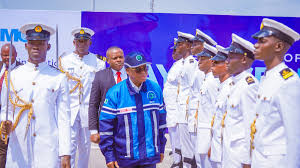In a decisive step toward modernizing maritime operations and protecting seafarers’ rights, the Federal Government has launched the Maritime Labour E-Platform—an ambitious digital solution aimed at overhauling how maritime labour is regulated, monitored, and supported across Nigeria’s growing blue economy.
The platform was officially unveiled during this year’s Seafarers Day celebration in Port Harcourt, Rivers State, where the Minister of Marine and Blue Economy described the innovation as a transformative tool for labour administration in the maritime sector.
“This E-Platform is a bold step toward digital governance, improved service delivery, and industry-wide innovation,” he said. “It will provide real-time access to data, enhance transparency, ensure regulatory compliance, and create a unified system for handling all maritime labour activities.”
The platform is expected to strengthen Nigeria’s compliance with international maritime labour standards, reduce exploitation, and eliminate administrative bottlenecks that have long plagued the industry. Its deployment also signals the government’s broader commitment to digital transformation and smarter public sector governance.
The Nigerian Maritime Administration and Safety Agency (NIMASA), which spearheaded the development of the platform, was applauded by the Minister for aligning with the Ministry’s strategic priorities: ease of doing business, global competitiveness, and inclusive human capital development in the maritime sector.
This year’s celebration also spotlighted the safety and wellbeing of those at the heart of the maritime sector—seafarers. Under the global theme *“My Harassment-Free Ship,”* the Minister emphasized the government’s zero-tolerance stance on harassment and bullying aboard ships.
“Harassment and bullying have no place in our maritime industry,” he said. “We are actively prioritizing the safety, dignity, and professional development of our seafarers. We are expanding capacity-building programmes, aligning our training with international frameworks like the STCW Convention, and integrating the latest anti-harassment amendments into our policies.”
The government’s reforms are not just about compliance—they are about creating an environment where Nigerian seafarers are protected, respected, and prepared to thrive in the global maritime labour market.
The Minister also highlighted ongoing reforms targeted at enhancing the welfare of seafarers. These include a renewed focus on the regulation of manning and recruitment agencies, ensuring that only ethical and licensed operators handle employment placements for seafarers.
In addition, the Ministry is working closely with shipowners and international partners to improve working and living conditions on board vessels, ensure fair treatment of Nigerian workers, and enforce decent work principles across the board.
A significant achievement in this regard is the Collective Bargaining Agreement facilitated by NIMASA in partnership with labour unions and key industry stakeholders. The agreement sets new standards for wages, conflict resolution, and employment terms—serving as a milestone in the protection of maritime labour rights.
Dr. Dayo Mobereola, Director General of NIMASA, reaffirmed the agency’s role as a champion of maritime labour reform and welfare enhancement. “This year’s theme is not just a slogan—it is a call to action,” he said. “Our seafarers must feel safe, valued, and protected while they serve at sea. Their wellbeing is essential to the growth and reputation of our maritime industry.”
Dr. Mobereola noted that NIMASA will continue to promote global best practices, particularly in the areas of training, safety standards, and compliance with the Maritime Labour Convention (MLC). He emphasized that these initiatives are crucial not only for seafarer protection but also for Nigeria’s economic positioning in the global shipping space.
With the launch of the Maritime Labour E-Platform, Nigeria is setting a new standard for governance in the maritime space. By embracing technology, promoting transparency, and placing worker welfare at the centre of policy, the government is creating the conditions for a stronger, more respected maritime industry—one that can compete globally and deliver value locally.
For MSMEs operating in the maritime value chain, the reforms could usher in a new era of efficiency and compliance. And for seafarers, this marks a renewed assurance that their safety, rights, and contributions are being recognized and protected.
As Nigeria continues to develop its blue economy, initiatives like the Maritime Labour E-Platform are essential in charting a course toward sustainable growth, inclusive labour practices, and international credibility.










